Brits who currently receive the personal independence payment (Pip) will continue to do so after the Government’s concessions to Labour rebels on welfare reforms.
Adjustments to universal credit would also see incomes protected, according to a letter from Work and Pensions Secretary Liz Kendall to MPs late last night.
The announcement comes after crisis talks with backbenchers, with some 126 MPs within the party signing an amendment that would halt the legislation in its tracks.
Sir Keir Starmer’s Universal Credit and Personal Independence Payment Bill has its second reading on July 1, the first opportunity for MPs to support or reject it.
The Government’s original package restricted eligibility for Pip, the main disability payment in England, and limited the sickness-related element of Universal Credit.
But the change in Pip payments is now expected to protect some 370,000 existing claimants who were expected to lose out following reassessment.
What has happened?
Sir Keir Starmer has backed down in the face of a major rebellion over welfare cuts.
The Government has offered Labour rebels a series of concessions in an effort to head off the Prime Minister’s first major Commons defeat since coming to power.
Some 126 Labour backbenchers had signed an amendment that would halt the Universal Credit and Personal Independence Payment Bill in its tracks.
The concessions mean people who currently receive the personal independence payment (Pip), the main disability payment in England, will continue to do so.
A letter from Work and Pensions Secretary Liz Kendall to MPs said adjustments to Universal Credit would also see incomes protected.

Prime Minister Sir Keir Starmer at a British Chambers of Commerce event in London yesterday
What will happen next?
Ministers now expect the Government’s welfare legislation to pass when it faces its first Commons hurdle on July 1.
Rebels now believe the concessions on offer, which include protecting Pip for all existing claimants, will be enough to win over a majority.
Asked this morning whether the Government now expected the Bill to pass, Health Minister Stephen Kinnock told Times Radio: ‘Yes.’
If the legislation clears its first hurdle next week, it will then face a few hours’ examination by all MPs the following week – rather than days or weeks in front of a committee tasked with looking at the Bill.
What was the original plan?
The Government’s original package restricted eligibility for Pip and cut the health-related element of Universal Credit, saying this would save around £5billion a year by 2030.
Existing claimants were to be given a 13-week phase-out period of financial support in an earlier move that was seen as a bid to head off opposition by aiming to soften the impact of the changes.
What is changing?
Now, the changes to Pip eligibility will be implemented in November 2026 and apply to new claimants only while all existing recipients of the health element of Universal Credit will have their incomes protected in real terms.
The change in Pip payments is expected to protect some 370,000 existing claimants who were expected to lose out following reassessment.
Work and Pensions Secretary Liz Kendall confirmed the U-turn in a letter to MPs late last night, along with plans for a review of the Pip assessment to be led by disabilities minister Sir Stephen Timms and ‘co-produced’ with disabled people.
The so-called ‘reasoned amendment’ tabled by Treasury select committee chairwoman Dame Meg Hillier had argued that disabled people have not been properly consulted and further scrutiny of the changes is needed.
The changes represent a major climbdown for the Prime Minister, just days after he insisted he would ‘press on’ with the cuts, arguing there was a ‘moral case’ for them.
Does this mean more tax rises?
The concessions could leave Chancellor Rachel Reeves scrambling to fill a hole in her Budget this autumn, with the Institute for Fiscal Studies suggesting they could reduce the projected savings by at least £1.5billion per year.
The Resolution Foundation think tank has suggested that the changes could cost as much as £3billion and raised the prospect of further tax rises.
This morning, Health Minister Stephen Kinnock declined to be drawn on how the reduction would be covered, saying it was ‘very much the Chancellor’s job as we move into the budget in the autumn’.
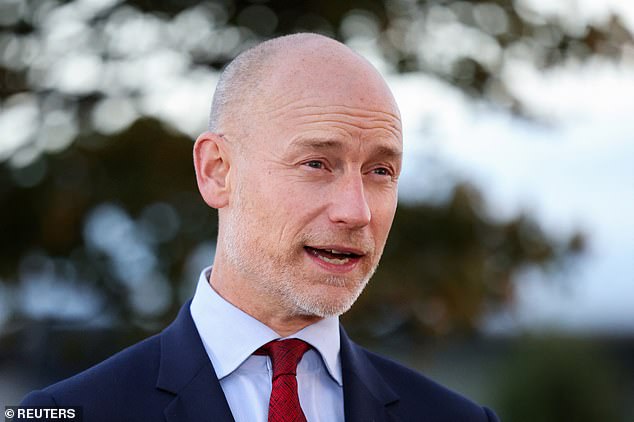
Health Minister Stephen Kinnock said today that the Government now expects the Bill to pass
What exactly is Pip?
Pip is a tax-free benefit aimed at helping the disabled with the increased cost of living associated with their conditions.
Pip is currently paid to 3.6million across England, Wales and Northern Ireland. In Scotland, a similar benefit is called the Adult Disability Payment.
Who can get Pip?
Pip is available to those who have a long-term physical or mental health condition or disability as well as difficulty doing certain everyday tasks or getting around because of their condition.
Pip can be paid even to people who are working, have savings or are getting most other benefits. It is not means tested.
How does Pip work?
There are two parts to Pip – 1) the daily living part, if someone needs help with everyday tasks; and 2) the mobility part, if they need help with getting around.
Whether they get one or both parts and how much they get depends on how difficult they find everyday tasks and getting around.
Anyone nearing the end of life such as from a life-limiting illness will automatically get the daily living part – but the mobility part depends on their needs.
How much can you get from Pip?
There is a lower and a higher weekly rate for the daily living part, which is £73.90 and £110.40 respectively.
For the mobility part, the rates are £29.20 the lower and £77.05 for the higher.
Pip is normally paid every four weeks.

Work and Pensions Secretary Liz Kendall confirmed the U-turn in a letter to MPs last night
What points number will you need to score for Pip?
Those currently apply for Pip need to score at least eight points in total to receive the ‘daily living element’.
Daily living activities are classed as ‘preparing food’, ‘eating and ‘drinking’, ‘managing your medicines or treatments’, ‘washing and bathing’, ‘using the toilet’, ‘dressing and undressing’, ‘reading’, ‘managing your money’, ‘socialising and being around other people’ and ‘talking, listening and understanding’.
From November 2026, claimants will still need to get at least eight points, but four of those will need to come from one single activity such as eating, washing or communicating.
This is because Labour is aiming to restrict entitlement to the daily living component to only those who are more severely disabled.
For example, to score four points on ‘washing and bathing’, a claimant ‘needs assistance to be able to wash their body between the shoulders and waist’.
There will be no changes to eligibility for the mobility part.
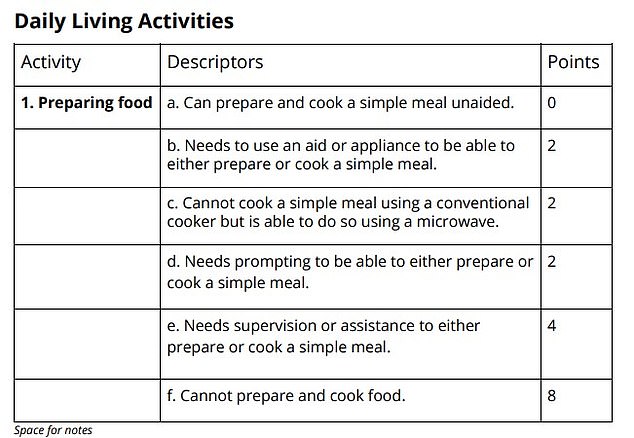
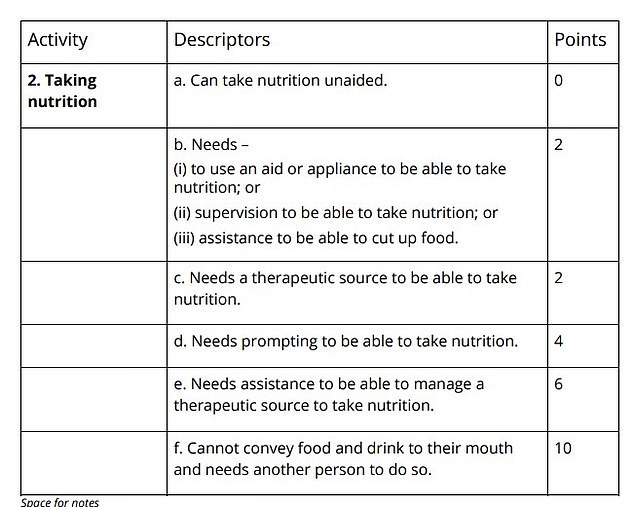
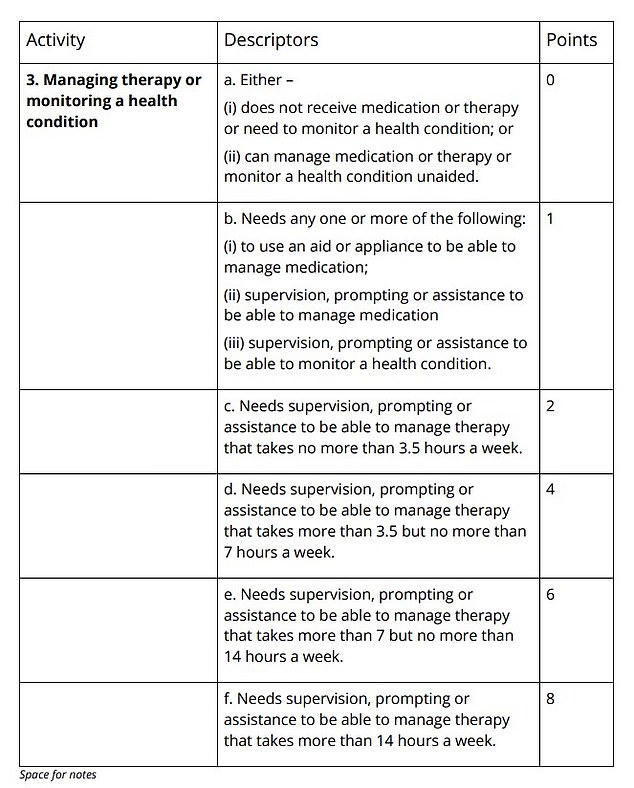
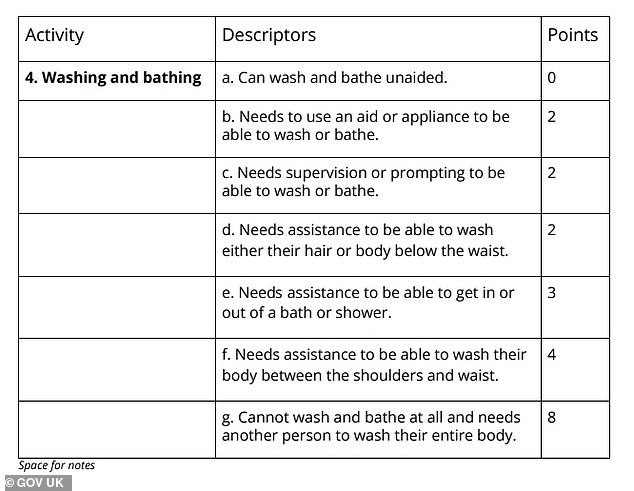
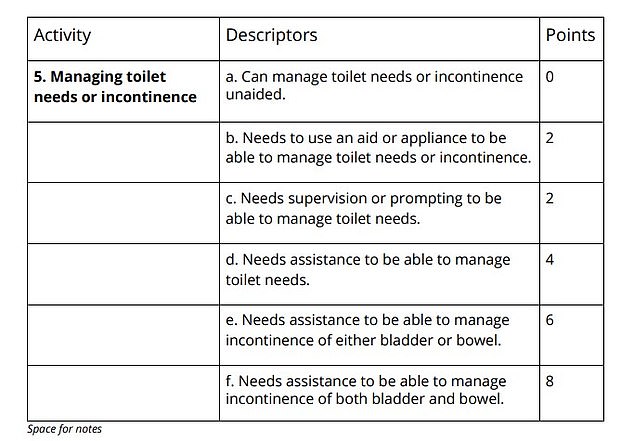
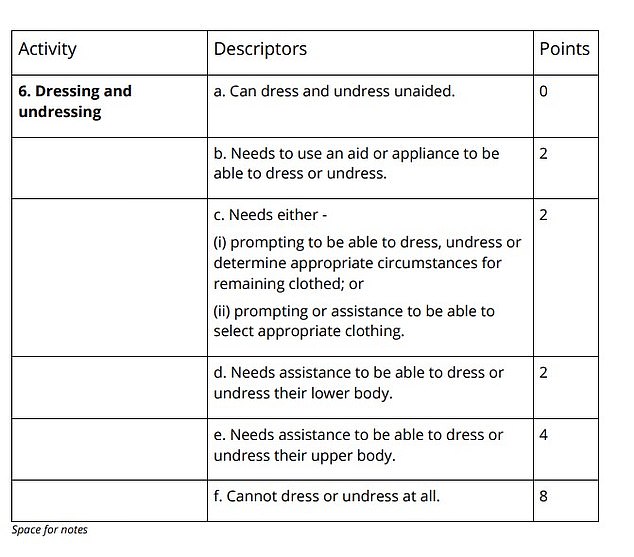
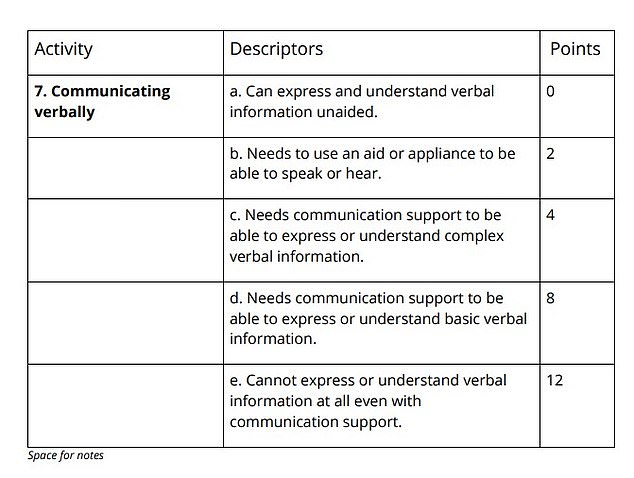
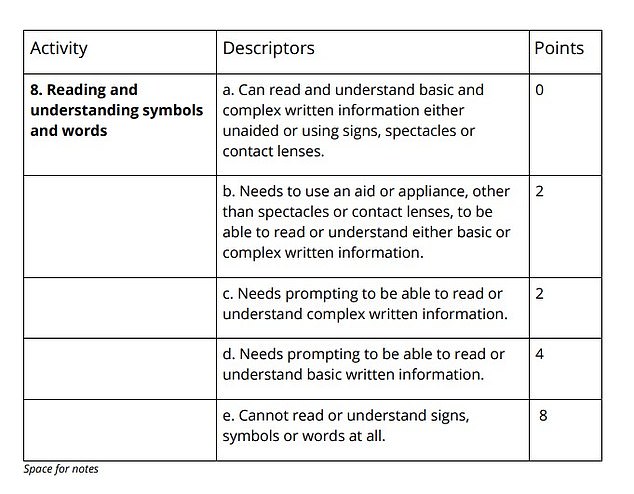
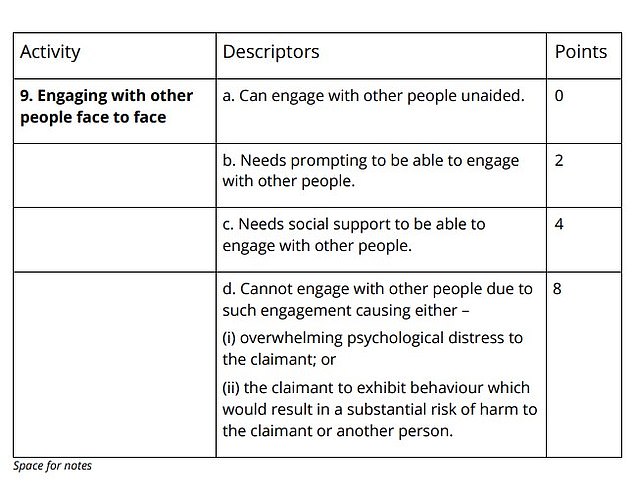
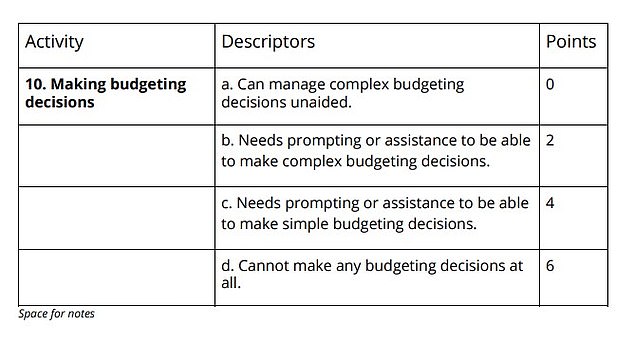
How is the assessment done?
The Department for Work and Pensions assesses how difficult someone finds daily living and mobility tasks, and looks at four areas for each task.
These are ‘whether you can do it safely’, ‘how long it takes you’, ‘how often your condition affects this activity’ and ‘whether you need help to do it, from a person or using extra equipment’.
Why is Pip being changed?
The number of people receiving one Pip has risen rapidly over the past five years and the Government believes this is now becoming unsustainable.
The number of working-age people receiving Pip has more than doubled from 15,300 to 35,100 a month since the pandemic.
The number of young people aged 16 to 24 receiving Pip per month has also skyrocketed from 2,967 to 7,857.
The Government believes that over the next five years, if no action is taken, the number of working age people claiming Pip will increase from 2million in 2021 to 4.3million, costing £34.1billion annually.
What has the Government said today?
A Number 10 spokesperson said: ‘We have listened to MPs who support the principle of reform but are worried about the pace of change for those already supported by the system.
‘This package will preserve the social security system for those who need it by putting it on a sustainable footing, provide dignity for those unable to work, supports those who can and reduce anxiety for those currently in the system.’
Are the rebels now rejoicing?
Dame Meg Hillier, one of the leading rebel voices, described the concessions as ‘a good deal’ involving ‘massive changes’ to protect vulnerable people and involve disability people in the design of future reforms.
She said: ‘It’s encouraging that we have reached what I believe is a workable compromise that will protect disabled people and support people back into work while ensuring the welfare system can be meaningfully reformed.’
But not all the rebels have been satisfied with the changes, with several suggesting they would create a ‘two-tier system’ and raising questions about who would be classified as a new claimant after November 2026.
Another said the U-turn would probably be enough to see off the rebellion, but warned that discontent and low morale among the backbenches would ‘continue to fester’ without a ‘wider reset’ of relations between Number 10 and the Parliamentary Labour Party.

Chancellor Rachel Reeves visits outdoor education manufacturing firm Cosy in Tutbury near Burton-on-Trent yesterday to mark the launch of the UK Government’s Trade Strategy
How are campaigners reacting?
There was a mixed reaction among charities to the prospect of concessions.
Learning disability charity Mencap said the news would be a ‘huge relief to thousands of people living in fear of what the future holds’.
But the MS Society urged rebels to hold firm and block the Bill, insisting any Government offer to water down the reforms would amount to ‘kicking the can down the road and delaying an inevitable disaster’.
What have the Tories said?
The Conservatives described concessions as ‘the latest in a growing list of screeching U-turns’ from the Government.
Shadow chancellor Mel Stride said: ‘Under pressure from his own MPs, Starmer has made another completely unfunded spending commitment.
‘Labour’s welfare chaos will cost hardworking taxpayers. We can’t afford Labour.’












